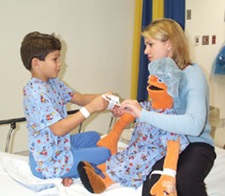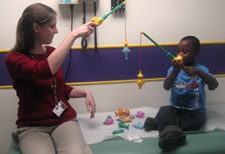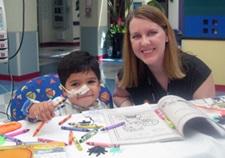In-Patient Education & Support
 Teaching & Preparation
Teaching & Preparation
Child life specialists help teach and prepare children for procedures and diagnoses using developmentally appropriate language and teaching supplies such as photos, real medical equipment, medical dolls, or written material. This includes giving children the opportunity to ask questions and learn what to expect in the hospital. Strong emphasis is placed on what the child will feel, hear, taste, smell, and see. Studies indicate that children are better equipped to cope with new situations when they know what to expect and what is expected of them.
Medical Play
Medical play provides children with the opportunity to "play doctor" using real medical equipment and medical dolls. This activity allows the child to express feelings, gain a better understanding of medical procedures, and retain control over their environment. This type of play can also alert adults about children's feelings, fears, and misconceptions in order to best help the child cope with their healthcare experience.
Advocacy
Child life specialists often serve as a liaison between the family and hospital staff. They also can help ensure that the medical staff understands a child's emotional needs.
 Grief/Bereavement Support
Grief/Bereavement Support
Children sometimes have to deal with grief and bereavement issues while in the hospital, whether it is the death of a sibling, changes in mobility due to an injury, or another form of loss. Child life specialists can provide therapeutic activities that allow children to express their emotions. Child life specialists also have information about children's reactions to death and grief and community resources available to assist families.
Emotional Support
Child life specialists are trained to establish a non-threatening relationship with children and teens, which helps them build trust of the medical staff and environment. This is done by providing emotional support and encouraging children to express their feelings.

Procedural Support
Child life specialists are available to help children and families cope with difficult procedures. Different coping strategies, such as deep breathing or blowing bubbles, can help children relax during medical procedures. Positive coping allows children to gain a sense of control over their experience and learn effective strategies to use in the future during stressful events.
Recreation Normalization
Familiar activities help children bridge the gap between home and the hospital environment. The child life department provides activities such as games, books, movies, and art projects in order to enhance children's ability to cope with hospitalization. There are also four playrooms located throughout the children's hospital; each has a Wii video game system and a variety of toys and games for children of all ages.
Holiday Celebrations
Holidays can be especially difficult time for hospitalized children and their families because normal family routines are disrupted. The child life department provides alternative ways for children and families to celebrate these special events so that they can gather together and have fun. All major holidays such as Easter, Thanksgiving, and Christmas are celebrated with the children in the hospital. Additional special celebrations include a Gasparilla Parade, Christmas in July, and Halloween. Every child who has a birthday while in the hospital is presented with something special to celebrate their special day.
Community Events
Entertainment such as an arts and craft activity, a musical performance, or a celebrity visit can makes the hospital stay more enjoyable for children and families. These activities typically take place in the lobby of the children's hospital.
Playrooms
There are four playrooms located throughout the children's hospital. These settings are designed to provide children with a temporary escape from the stress of the hospital environment. Siblings and friends of hospital patients are also welcomed to use the playrooms. There is a variety of toys and games for children and teens, including a Wii video game system. Scheduled activities are also sometimes provided by child life specialists and unit volunteers.
Teen Lounge
Teens and their brothers and sisters age 12 and older are welcome to visit the Teen Lounge on the 1st floor of the children's hospital. The Teen Lounge features video games, a foosball table, board games, and more. Every Friday night from 6-8pm, teens and their friends are invited to participate in Teen Wii Night.

